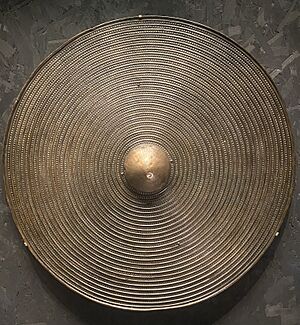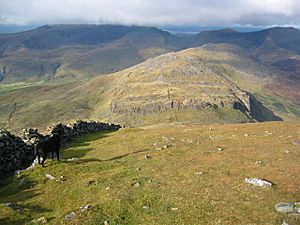Moel Hebog shield facts for kids
Quick facts for kids Moel Hebog shield |
|
|---|---|
| Tarian Moel Hebog | |

Moel Hebog shield. Wales, 1300–1000 BC. On display at the British Museum.
|
|
| Material | Welsh sheet-bronze |
| Discovered | 1300–1000 BC |
| Present location | British Museum |
The Moel Hebog shield (which in Welsh is called Tarian Moel Hebog) is a very old shield from the Bronze Age. It is made from a mix of metals, mostly copper. People found this special shield in Wales way back in 1784. Today, you can see it at the British Museum in London. Experts believe it was made a very long time ago, between 1300 and 1000 BC.
Contents
What Is the Moel Hebog Shield?
This ancient shield was found in a wet, muddy area called a bog. It was discovered near a mountain called Moel Hebog in Wales. This happened in 1784, close to a town named Beddgelert. Some old records suggest it might have been found near another mountain, Moel Siabod.
The shield is a great example of how people in the late Bronze Age started making large objects from thin sheets of bronze. This shows that people back then thought of themselves as warriors. They put a lot of effort into making special metal armor for ceremonies and battles.
Why Is This Shield Important?
The Moel Hebog shield is a very important piece of history. It helps us understand what life was like during the Bronze Age. It shows us how skilled ancient people were at working with metal. It also gives us clues about their culture and how they might have used such shields.
Where Is the Moel Hebog Shield Now?
Today, the Moel Hebog shield is kept safe at the British Museum in London. It is part of their amazing collection of ancient items. Many people visit the museum to see this shield and learn about its past.
Calls for the Shield to Return to Wales
Because the shield was found in Wales, some people believe it should be returned there. They think it belongs in a museum in Wales, closer to where it was discovered. This idea is part of a bigger discussion about returning ancient items to their original homes.
See also
- Archaeology of Wales


